Charles E W Bean, Diaries, AWM38 3DRL 606/7/1 - May 1915 - Part 7
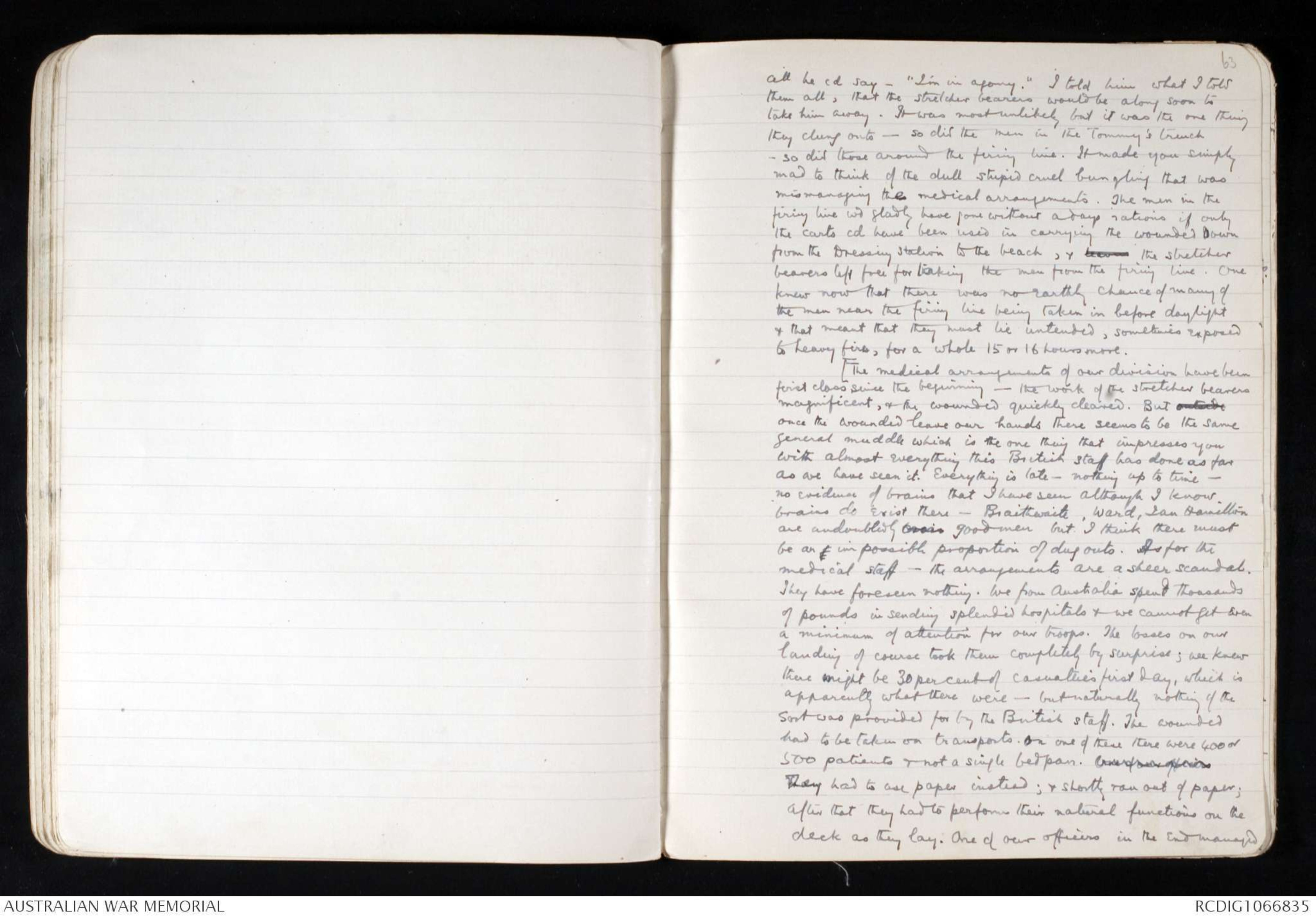
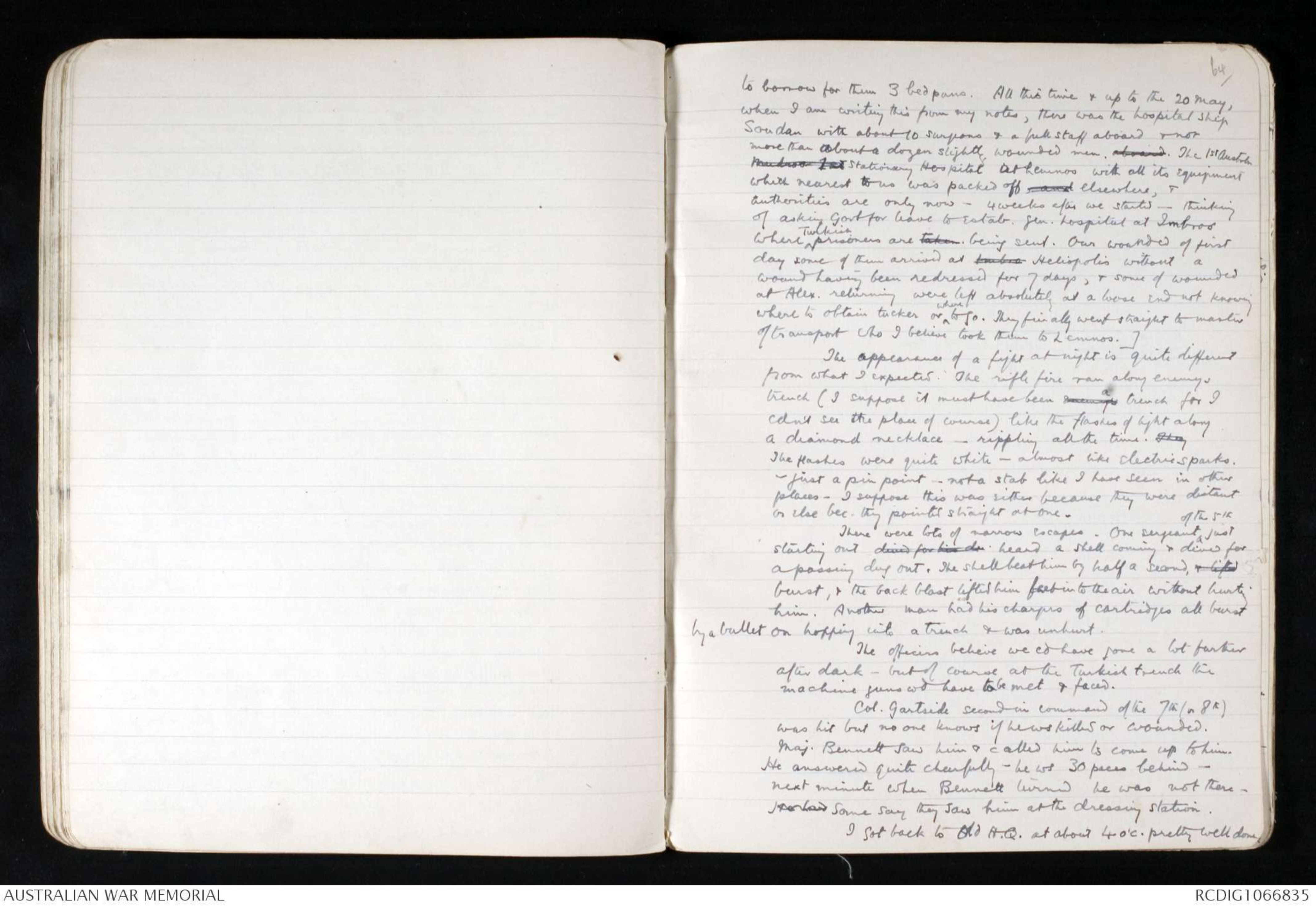
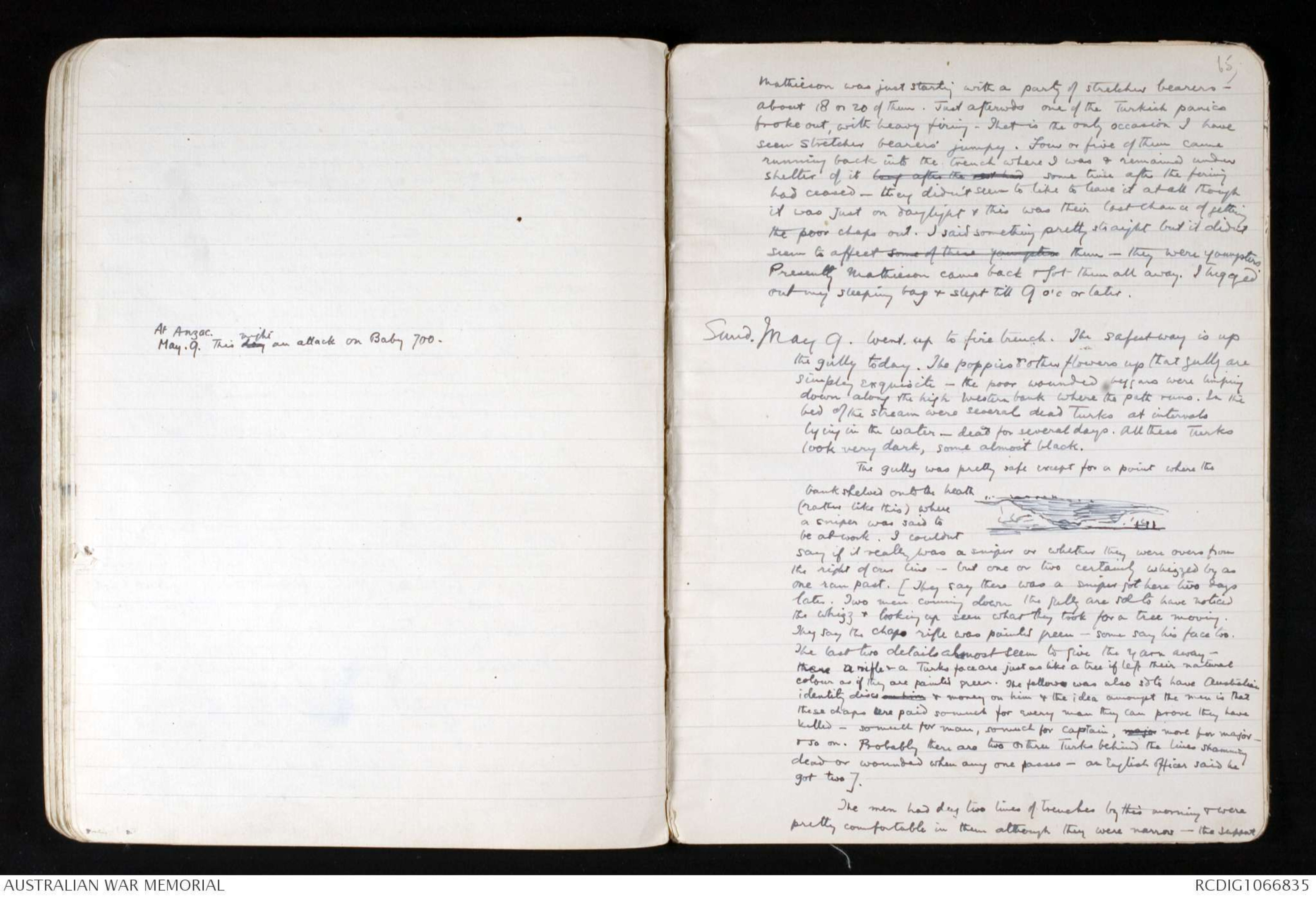
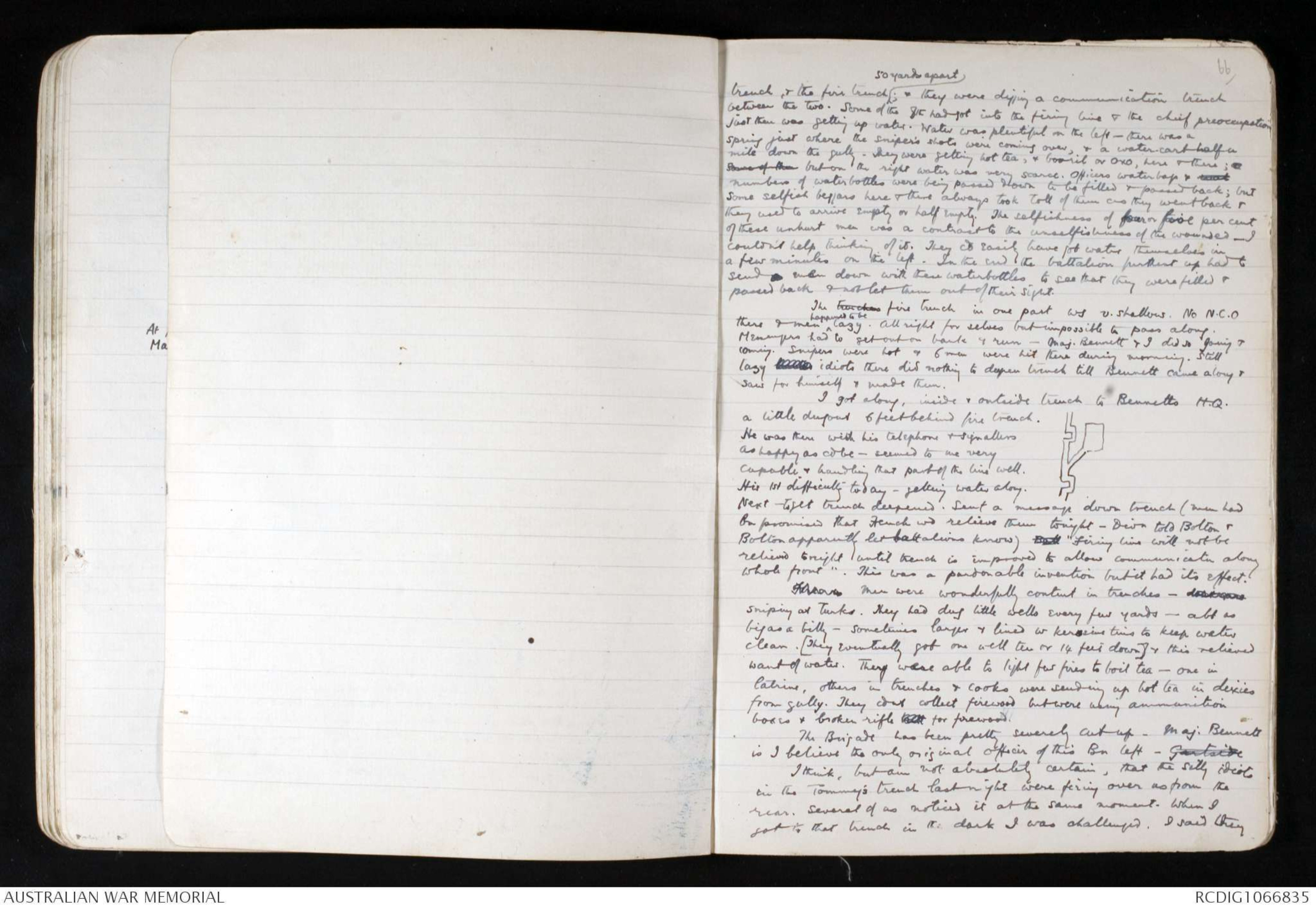
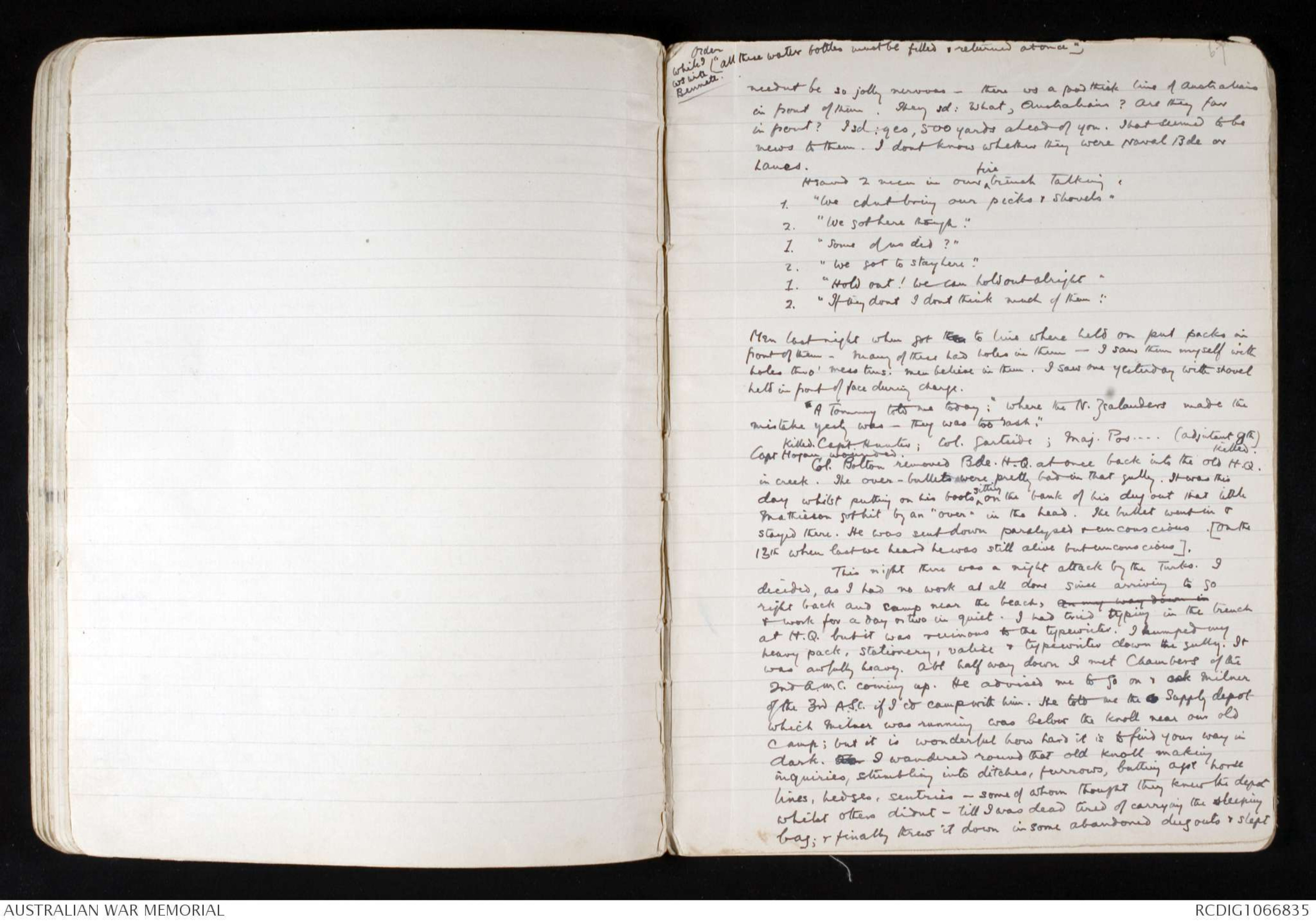
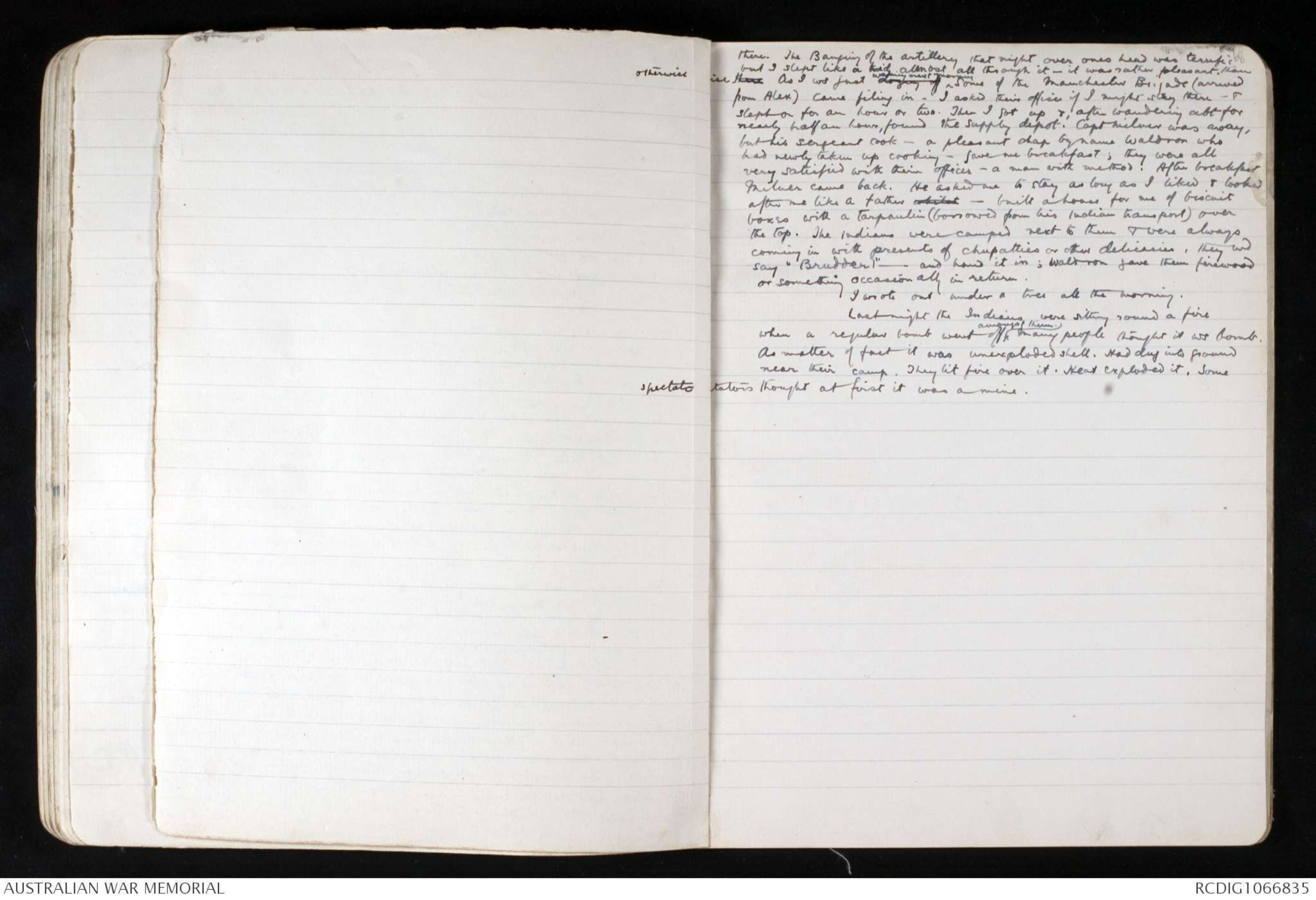
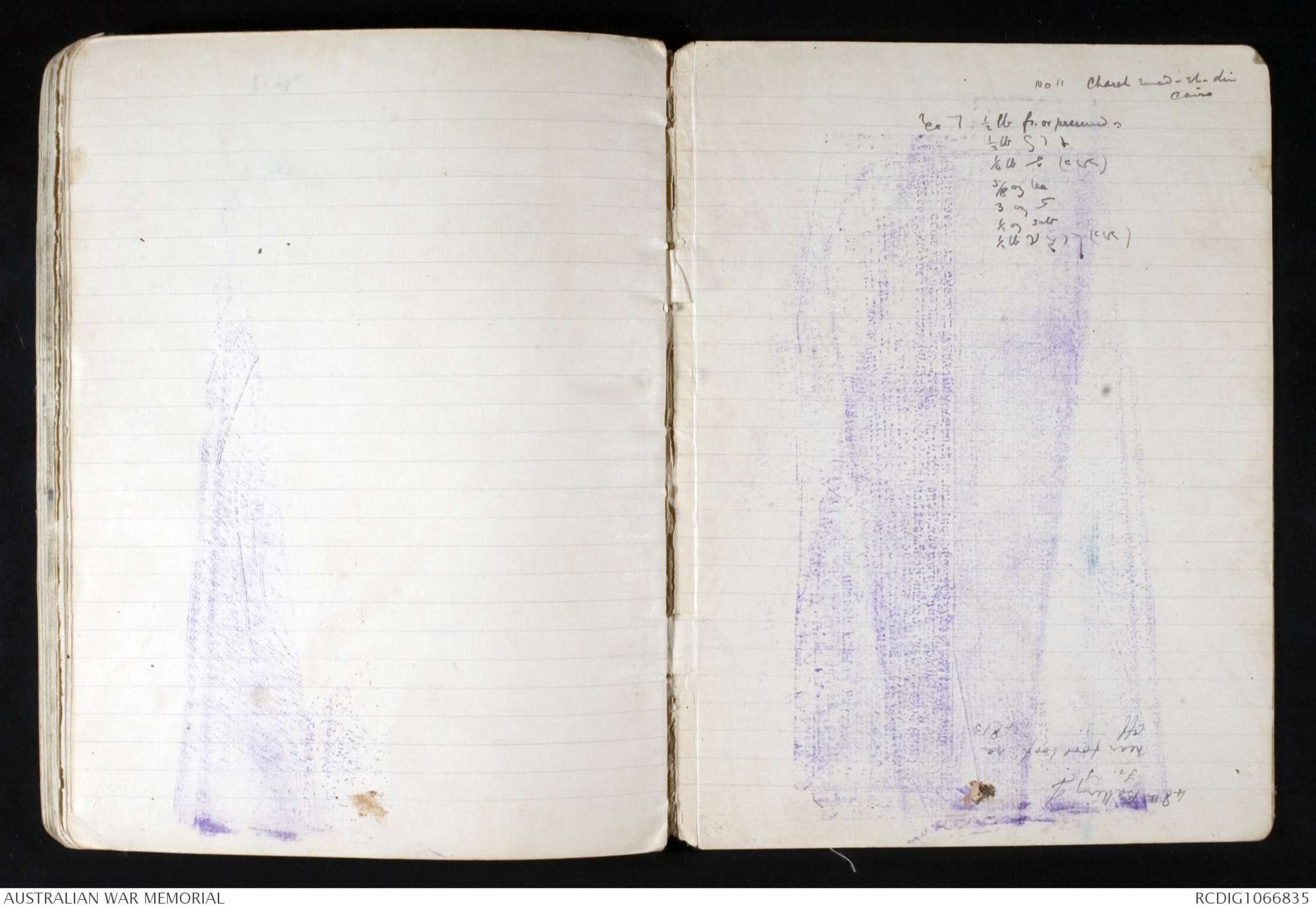
63
all he cd say - "I'm in agony". I told him what I told
them all, that the stretcher bearers would be along soon to
take him away. It was most unlikely but it was the one thing
they clung onto - so did the men in the Tommy's trench
- so did those around the firing line. It made you simply
mad to think of the dull stupid cruel bungling that was
mismanaging the medical arrangements. The men in the
firing line wd gladly have gone without a days rations if only
the carts cd have been used in carrying the wounded Down
from the Dressing Station to the beach, & leave the stretcher
bearers left free for taking the men from the firing line. One
knew now that there was no earthly chance of many of
the men near the firing line being taken in before daylight
& that meant that they must lie untended, sometimes exposed
to heavy fire, for a whole 15 or 16 hours more.
[The medical arrangements of our division have been
first class since the beginning - the work of the stretcher bearers
magnificent, & the wounded quickly cleared. But outside
once the wounded leave our hands there seems to be the same
general muddle which is the one thing that impresses you
with almost everything this British staff has done as far
as we have seen it. Everything is late - nothing up to time -
no evidence of brains that I have seen although I know
brains do exist there - Braithwaite, Ward, Ian Hamilton
are undoubtedly brain good men but I think there must
be an x impossible proportion of dug outs. As for the
medical staff - the arrangements are a sheer scandal.
They have foreseen nothing. We from Australia spend thousands
of pounds in sending splendid hospitals & we cannot get even
a minimum of attention for our troops. The losses on our
landing of course took them completely by surprise; we knew
there might be 30 per cent of casualties first day, which is
apparently what there were - but naturally nothing of the
sort was provided for by the British staff. The wounded
had to be taken on transports. On one of these there were 400 or
500 patients & not a single bed pan. One of our officers
They had to use paper instead; & shortly ran out of paper;
after that they had to perform their natural functions on the
deck as they lay. One of our officers in the end managed
64
to borrow for them 3 bed pans. All this time & up to the 20 May,
when I am writing this from my notes, there was the hospital ship
Soudan with about 10 surgeons & a full staff aboard & not
more than about a dozen slightly wounded men. aboard. The 1st AustralianMudros 1st Stationary Hospital at Lemnos with all its equipment
which nearest to us was packed off and elsewhere, &
authorities are only now - 4 weeks after we started - thinking
of asking Govt for leave to estab. gen. hospital at Imbros
where ^Turkish prisoners are taken being sent. Our wounded of first
day some of them arrived at Imbros Heliopolis without a
wound having been redressed for 7 days, & some of wounded
at Alex. returning were left absolutely at a loose end not knowing
where to obtain tucker or ^where to go. They finally went straight to master
of transport who I believe took them to Lemnos.]
The appearance of a fight at night is quite different
from what I expected. The rifle fire ran along enemys
trench (I suppose it must have been xxxxx ^a trench for I
cdn't see the place of course) like the flashes of light along
a diamond necklace - rippling all the time. They
The flashes were quite white - almost like electric sparks.
- just a pin point - not a stab like I have seen in other
places - I suppose this was either because they were distant
or else bec. they pointed straight at one.
There were lots of narrow escapes. One sergeant ^ of the 5th just
starting out dived for his dr heard a shell coming & dived for
a passing dug out. The shell beat him by half a second, & lifted
burst, & the back blast lifted him feet in the air without hurting
him. Another man had his chargers of cartridges all burst
by a bullet on hopping into a trench & was unhurt.
The officers believe we cd have gone a lot further
after dark - but of course at the Turkish trench the
machine guns wd have to be met & faced.
Col. Gartside second in command of the 7th (or 8th)
was hit but no one knows if he ws killed or wounded.
Maj. Bennett saw him & called him to come up to him.
He answered quite cheerfully - he ws 30 paces behind -
next minute when Bennett turned he was not there - He had Some say they saw him at the dressing station.
I got back to old H.Q. at about 4 o'c. pretty well done.
At Anzac.
May 9. This day ^night an attack on Baby 700.
65
Mathieson was just starting with a party of stretcher bearers -
about 18 or 20 of them. Just afterwds one of the Turkish panics
broke out, with heavy firing. That is the only occasion I have
seen stretcher bearers jumpy. Four or five of them came
running back into the trench where I was & remained under
shelter of it long after the rest had some time after the firing
had ceased - they didn't seem to like to leave it at all though
it was just on daylight & this was their last chance of getting
the poor chaps out. I said something pretty straight but it didn't
seem to affect some of these youngsters them - they were youngsters.
Presently Mathieson came back & got them all away. I tugged
out my sleeping bag & slept till 9 o'c or later.
Sund. May 9. Went up to fire trench. The safest way is up
the gully today. The poppies & other flowers up that gully are
simply exquisite - the poor wounded beggars were limping
down along the high western bank where the path runs. In the
bed of the stream were several dead Turks at intervals
lying in the water - dead for several days. All these Turks
look very dark, some almost black.
The gully was pretty safe except for a point where the
bank shelved onto the heath
[Hand drawn diagram - see original]
(rather like this) where
a sniper was said to
be at work. I couldn't
say if it really was a sniper or whether they were overs from
the right of our line - but one or two certainly whizzed by as
one ran past. [They say there was a sniper got here two days
later. Two men coming down the gully are sd to have noticed
the whizz & looking up seen what they took for a tree moving.
They say the chaps rifle was painted green - some say his face too.
The last two details almost seem to give the yarn away - there a rifle & a Turks face are just as like a tree if left their natural
colour as if they are painted green. The fellows was also sd to have Australian
identity discs on him & money on him & the idea amongst the men is that
these chaps are paid so much for every man they can prove they have
killed - so much for man, so much for captain, major more for major -
& so on. Probably there are two or three Turks behind the lines shamming
dead or wounded when any one passes - an English officer said he
got two].
The men had dug two lines of trenches by this morning & were
pretty comfortable in them although they were narrow - the support
66
trench, & the fire trench, ^50 yards apart; & they were digging a communication trench
between the two. Some of the 8th had got into the firing line & the chief preoccupation
just then was getting up water. Water was plentiful on the left - there was a
spring just where the sniper's shots were coming over, & a water cart half a
mile down the gully. They were getting hot tea, & bovril or oxo, here & there; asome of them but on the right water was very scarce. Officers water bags & wat
numbers of water bottles were being passed down to be filled & passed back; but
some selfish beggars here & there always took toll of them as they went back &
they used to arrive empty or half empty. The selfishness of four or five per cent
of these unhurt men was a contrast to the unselfishness of the wounded and
couldn't help thinking of it. They cd easily have got water themselves in
a few minutes on the left. In the end the battalion furthest up had to
send x men down with these waterbottles to see that they were filled &
passed back & not let them out of their sight.
The Trenchers fire trench in one part ws v. shallow. No N.C.O.
there & men ^happened to be lazy. All right for selves but impossible to pass along.
Messengers had to get out on bank & run - Maj. Bennett & I did so going &
coming. Snipers were hot & 6 men were hit there during morning. Still
lazy xxxx idiots there did nothing to deepen trench till Bennett came along &
saw for himself & made them.
I got along inside & outside trench to Bennetts H.Q.
a little dugout 6 feet behind fire trench.
[Hand drawn diagram - see original]
He was there with his telephone & signallers
as happy as cd be - seemed to me very
capable & handling that part of the line well.
His 1st difficulty today - getting water along.
Next - to get trench deepened. Sent a message down trench (men had
bn promised that French wd relieve them tonight - Divn told Bolton &
Bolton apparently let battalions know) Batt "Firing line will not be
relieved tonight until trench is improved to allow communication along
whole front". This was a pardonable invention but it had its effect.xxxx Men were wonderfully content in trenches - xxxxx
sniping at Turks. They had dug little wells every few yards - abt as
big as a billy - sometimes larger & lined w kerosine tins to keep water
clean. [They eventually got one well ten or 14 feet down] & this relieved
want of water. They were able to light few fires to boil tea - one in
latrine, others in trenches & cooks were sending up hot tea in dixies
from gully. They cdn't collect firewood but were using ammunition
boxes & broken rifle butt for firewood.
The Brigade had been pretty severely cut up - Maj. Bennett
is I believe the only original officer of this Bn left - Gartside
I think, but am not absolutely certain, that the silly idiots
in the Tommy's trench last night were firing over us from the
rear. Several of us noticed it at the same moment. When I
got to their trench in the dark I was challenged. I said they
67
[* Order While I ws with Bennett. ("all these water bottles must be filled & returned at once"*]
neednt be so jolly nervous - there was a good thick line of Australians
in front of them. They sd: What, Australians? Are they far
in front? I sd: yes, 500 yards ahead of you. That seemed to be
news to them. I don't know whether they were Naval Bde or
Lancs.
Heard 2 men in our ^fire trench talking,
1. "We cdnt bring our picks & shovels"
2. "We got here though."
1. "Some of us did?"
2. "We got to stay here."
1. "Hold out! We can hold out alright"
2. "If they dont I dont think much of them."
Men last night when got then to line where held on put packs in
front of them - Many of these had holes in them - I saw them myself with
holes thro' mess tins. Men believe in them. I saw one yesterday with shovel
held in front of face during charge.
A Tommy told me today: "where the N. Zealanders made the
mistake yesty was - they was too rash."
Killed Capt. Hunter; Col. Gartside; Maj. Pos . . . . (adjutant 9th killed)
Capt. Hogan wounded.
Col. Bolton removed Bde H.Q. at once back into the old H.Q.
in creek. The over-bullets were pretty bad in that gully. It was this
day whilst putting on his boots ^sitting on the bank of his dug out that little
Mathieson got hit by an "over" in the head. The bullet went in &
stayed there. He was sent down paralysed & unconscious. [On the
13th when last we heard he was still alive but unconscious].
This night there was a night attack by the Turks. I
decided, as I had no work at all done since arriving to go
right back and camp near the beach, on my way down in
& work for a day or two in quiet. I had tried typing in the trench
at H.Q. but it was ruinous to the typewriter. I humped my
heavy pack, stationery, valise & typewriter down the gully. It
was awfully heavy. Abt half way down I met Chambers of the
2nd A.M.C. coming up. He advised me to go on & ask Milner
of the 3rd A.S.C. if I cd camp with him. He told me the xx Supply Depot
which Milner was running was below the knoll near our old
camp; but it is wonderful how hard it is to find your way in
dark. Xxx I wandered around that old knoll making
inquiries, stumbling into ditches, furrows, butting agst horse
lines, hedges, sentries - some of whom thought they knew the depot
whilst others didnt - till I was dead tired of carrying the sleeping
bag; & finally threw it down in some abandoned dugouts & slept
68
there. The banging of the artillery that night over ones head was terrific
but I slept like a kid almost all through it - it was rather pleasant than
otherwise there As I ws just dozing off ^waking next morning some of the Manchester Brigade (arrived
from Alex) came filing in. I asked their officer if I might stay there - &
slept on for an hour or two. Then I got up &, after wandering abt for
nearly half an hour, found the supply depot. Capt Milner was away,
but his sergeant cook - a pleasant chap by name Waldron who
had newly taken up cooking - gave me breakfast; they were all
very satisfied with their officer - a man with method. After breakfast
Milner came back. He asked me to stay as long as I liked & looked
after me like a father whilst - built a house for me of biscuit
boxes with a tarpaulin (borrowed from his Indian transport) over
the top. The Indians were camped next to them & were always
coming in with presents of chupatties or other delicacies. They wd
say "Brudder!" — and hand it in; Waldron gave them firewood
or something occasionally in return.
I wrote out under a tree all the morning.
Last night the Indians were sitting round a fire
when a regular bomb went off ^amongst them. Many people thought it ws bomb.
As a matter of fact it was unexploded shell. Had dug into ground
near their camp. They lit fire over it. Heat exploded it. Some
spectators thought at first it was a mine.
No 11 Charol Emad-el-din
Cairo
[shorthand] 1/2 lb fr or preserved [shorthand]
1/2 lb S [shorthand]
1/4 lb [shorthand]
5/8 oz tea
3 oz [shorthand]
1/2 oz salt
1/2 lb [shorthand]
48th Battery of
Fr. [shorthand]
near fore hoof. no
off 4813
 Deb Parkinson
Deb ParkinsonThis transcription item is now locked to you for editing. To release the lock either Save your changes or Cancel.
This lock will be automatically released after 60 minutes of inactivity.